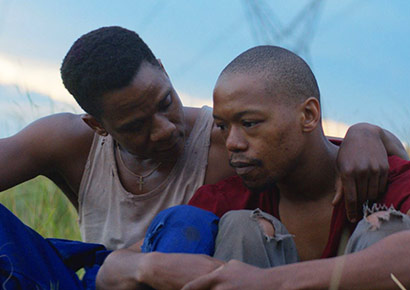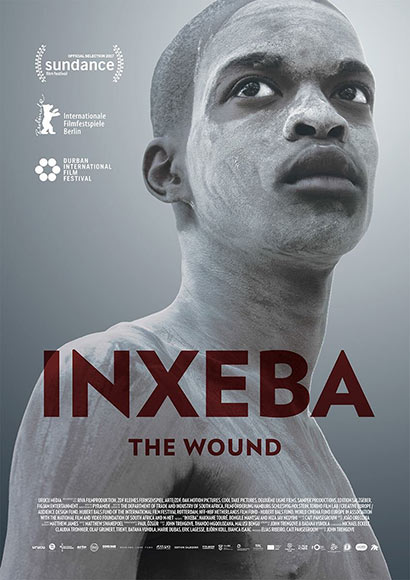AmaXhosa king gay film ban | Festival will go ahead with screening of Inxeba (The Wound)
 The Durban Gay & Lesbian Film Festival is defiant in response to a call by amaXhosa king Zwelonke Sigcawu to ban the acclaimed gay-themed South African film Inxeba (The Wound).
The Durban Gay & Lesbian Film Festival is defiant in response to a call by amaXhosa king Zwelonke Sigcawu to ban the acclaimed gay-themed South African film Inxeba (The Wound).
Directed by John Trengove, Inxeba tells the story of Xolani, a lonely closeted Xhosa factory worker who joins the men of his community in the mountains of the Eastern Cape to initiate a group of teenage boys into manhood.
While it’s been lauded around the world, the drama has come under fire from traditionalists not only for its frank exploration of masculinity and homosexuality in South African culture, but also for its depiction of sacred male initiation rites.
Set to open the 7th annual Durban Gay & Lesbian Film Festival (DGLFF) on Friday, Inxeba has been accused by some on social media of cultural exploitation. The cast and crew have also been threatened, with lead actor Nakhane Touré subjected to violent threats, including that of being burnt alive.
The king’s lawyer, Matthew Mpahlwa, told News24 last week, that Sigcawu was planning to file a complaint with the Film and Publications Board. He is also threatening to approach the courts to stop the film’s screening and distribution.
“His subjects are complaining,” said Mpahlwa. “There’s a lot of panic among the amaXhosa people who have undertaken the rituals, some of the men mostly and they called on the kingdom of the amaXhosa to intervene.”
Mpahlwa admitted that the king had not yet seen the film, explaining: “He has been seeing [the] trailers and people are just shocked.There is an extent [to] which freedom of expression can go… there are limits [to] which customs… can be exposed.”
Festival Director Jason Fiddler said that the threats of violence and censorship were an attack on freedom of speech and expression. He was defiant in stating that, “Inxeba will open our festival this Friday”.
Fiddler went on to say that, “there is no basis for us, as lesbian, gay, bisexual, transgender, intersex and queer citizens of our republic, to cower in fear of homophobic violence or borderline hate speech”.
He noted that LGBTQ people were not only targeted by the apartheid state but today still “remain in a near daily struggle against all forms of abuse and discrimination, conveniently wrapped up in religious, cultural and patriarchal excuses”.
Fiddler added: “We can no more ignore the existence of gay men in all communities than we can ignore the fact that many men in our society direct violence towards women and children. There is a genuinely serious problem in our country with regards to how men across all cultures see themselves, and the growing homophobia we are seeing taking root.”
The film deals with patriarchy, culture and LGBTQ identity
Inxeba’s filmmakers have pointed out that the film is certainly not the first to provide a glimpse into initiation rituals. Former President Nelson Mandela, in his book Long Walk to Freedom, describes at length and in detail his experience of becoming a Xhosa man. The ritual was also depicted in the feature film biopic of the same title, distributed worldwide and produced by Anant Singh’s Videovision.
“We view these inexcusable threats in a serious light, and we will be taking appropriate action against any individual who threatens violence or commits homophobic hate crimes,” said Producer Cait Pansegrouw, of Urucu Media.
“Inxeba has attracted much interest from the South African public, many of whom are eagerly anticipating its local release. From the feedback we receive daily on the film’s Facebook page, it is clear that the people attempting to shut the film down are speaking on behalf of a minority, and do not represent the ‘entire Xhosa nation’ as they claim.”
Pansegrouw said that, “Inxeba was filmed in isiXhosa and is a proudly South African film” and described it as, “a story that focuses on the complex relationship between traditional patriarchy and LGBTQ identity, issues which we believe are essential to speak about in contemporary South Africa”.
 While the filmmakers respect the decision of anyone who chooses not to watch Inxeba, Pansegrouw stated that, “we are fiercely committed to protecting the rights of South Africans who choose to view it, and make up their own minds about the value and integrity of the film”.
While the filmmakers respect the decision of anyone who chooses not to watch Inxeba, Pansegrouw stated that, “we are fiercely committed to protecting the rights of South Africans who choose to view it, and make up their own minds about the value and integrity of the film”.
The Durban LGBTI Community and Health Centre has also supported the screening of Inxeba at the festival. “This year’s festival brings us more local films, is screened at unprecedented spaces and will have more participation of communities from previously disadvantaged areas,” said centre Director Nonhlanhla Mkhize.
She added that, “we are particularly excited about Inxeba because the film is “encouraging conversations [about] culture, religion and human rights”.
The 7th Durban Gay & Lesbian Film Festival , boasting 48 diverse films, runs from 25 August to 3 September 2017 at various venues in the Durban area (click here for more).
- Facebook Messenger
- Total184
Leave a Reply